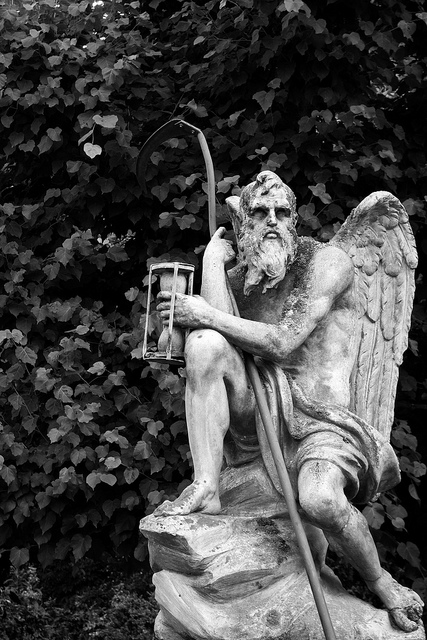THE GOD CHRONUS IN GREEK MYTHOLOGY
Chronus was a god of the Greek pantheon, and he is arguably one of the most interesting of all Greek gods and goddesses.
Generally speaking, Chronus can be regarded as the Greek god of time, or Father Time, but the deity appears only sparsely in surviving texts, and yet in these surviving texts it is clear that he was integral to some people’s interpretation of the creation myth.
Generally speaking, Chronus can be regarded as the Greek god of time, or Father Time, but the deity appears only sparsely in surviving texts, and yet in these surviving texts it is clear that he was integral to some people’s interpretation of the creation myth.
Chronus in Ancient texts
|
Today, the lineage of the gods is normally taken from Hesiod’s Theogony; and this is of course understandable as the book title itself means “genealogy of the gods”. This text is one of the few surviving works from this period, and has led to the Homeric tradition of the gods becoming famous.
Fragments of other texts though exist, and they have recorded other traditions which although often include the same gods as written about by Hesiod, also tell of different gods, and different timelines. It is from these fragments that the god Chronus is found. These alternate timelines include the Orphic tradition, work attributed to Orpheus. |
|
The Birth of Chronus
The most famous story of creation from Greek mythology tells of Protogenoi emerging from nothingness, with first Chaos, then Gaia, Eros and Tartarus coming into existence; and Hesiod’s version doesn’t mention a god called Chronus at all.
Other versions though, state that the Chronus was the son of Hydros, a primordial water god, and Gaia, the Protogenoi of the earth; or else he was born fully formed when the universe came into existence.
Other versions though, state that the Chronus was the son of Hydros, a primordial water god, and Gaia, the Protogenoi of the earth; or else he was born fully formed when the universe came into existence.
Depictions of Chronus
|
In the earliest surviving accounts, Chronus was normally depicted as a serpent like god, but also a god with three heads, one of a man, one of a bull, and a third of a lion. Chronus though, was also of indeterminate size, but they serpent coils of Chronus was said to encircle everything.
Generations after its original inception, the idea of Chronus would be taken up by Roman writers, and they would equate the Greek primordial god, with another god Aion (Eternity), and the imagery of the god would subsequently change. |
|
It was at this time that Chronus would become a “Father Time” figure, an old man with white beard, and holding on to an hourglass and sickle; and even today it is this imagery that is still thought of when people think of Father Time.
Chronus in Orphic Tradition
In this Orphic tradition, Chronus was said to work alongside a female equivalent goddess, Ananke, the Greek goddess of Inevitability; and the pair would ultimately bring order to the cosmos. The tails of the serpent deities, would encircle the world-egg, and as this occurred, the egg would split open bringing forth the earth, sea and the sky. The tails of Time and Inevitability would thereafter be involved in everything for all time.
The opening of the world egg also brought forth the primordial deity Phanes. Other Protogenoi were also thought to have been born to Chronus and Ananke, with Aither (Air), Chaos (Gap) and Erebus (Darkness) often named as their offspring.
The opening of the world egg also brought forth the primordial deity Phanes. Other Protogenoi were also thought to have been born to Chronus and Ananke, with Aither (Air), Chaos (Gap) and Erebus (Darkness) often named as their offspring.
Chronus not Cronus
In English, Chronus is often written down as Khronos or Chronos, and so it is easy to see how the Protogenoi god of time could be confused with the Titan god Cronus, (Kronos). This has meant hat, over the centuries, the two gods who were once distinct, being confused with each other and the Greek gods taking on the other’ attributes.
|
|
